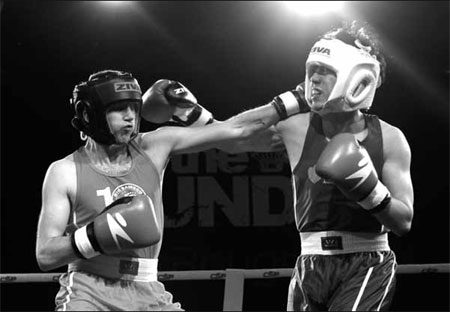Brawl on Bund a knockout for charity
Updated: 2013-06-18 07:46
By Xu Junqian in Shanghai (China Daily)
|
||||||||
|
Xie Yi (right) takes on a rival at a charity boxing competition in Shanghai on Saturday. Donations from the event will be used to support infants from poor families who need intensive care. Gao Erqiang / China Daily |
The champagne flowed. Loud music resonated through the hall. It was black ties for the men and gowns for the ladies.
Under the spotlights at the Hyatt on the Bund in Shanghai on Saturday night, two men climbed into the ring, sporting boxing vests and shorts, as cheers and jeers rang out.
This was the scene for Brawl on the Bund, the eighth white-collar boxing event held in the city.
Formerly the preserve of Shanghai's expatriate residents, this year's event saw increased Chinese interest.
"I'm fighting on behalf of all Shanghai men," joked Xie Yi, 32, a quality control manager for a foreign company. He was one of 14 contenders involved in seven-round bouts, and the first Chinese to take to the ring since the event started in 2008. Two of the contenders were women.
The charity fundraiser was organized by White-Collar Boxing China, founded by English entrepreneur Shane Benis to promote boxing, and backed by the Shanghai Children's Health Foundation.
White-collar boxing originated in 1988 in New York and is for office workers, most of whom have no boxing experience. They train for a minimum of three months, usually to raise money for charity.
For years, the government banned boxing in China, considering it "too cruel". The ban was lifted in 1986.
Du Wenjie, a boxing commentator with CCTV5, said that despite the high ratings earned by international professional boxing matches, most Chinese have to remain spectators as government doubts over the sport have yet to be fully erased.
"The government should be more open-minded," he said. "As long as a fighter abides by the rules, it's no different or more dangerous than other sports."
In May, China's General Administration of Sports released its first list of "highly dangerous" sports, which included swimming, diving, skiing, skating and rock climbing. Boxing was listed as "inappropriate for teenagers".
More than 560 people were in the audience for Saturday's Brawl on the Bund, with the cheapest tickets costing 1,000 yuan ($162), including a four-course meal.
The event was a sell-out, and Zhang Xinyin, one of the organizers, said tickets are already being booked for the next event in December.
Fifty people signed up to box, each having received the required three months of professional training. But not everyone could fight in the ring, with the final decision made by trainers and doctors.
The event raised 309,000 yuan, including ticket sales and an auction. The money will be donated to Leo's Foundation, which helps newborns with respiratory failure in China.
The foundation was set up in 2008 in Shanghai by an English couple, Scott and Cecile Spirit, in memory of their son Leo who died from severe respiratory failure at Fudan University's Children's Hospital.
"The event has so far helped about 30 premature babies with respiratory disease and has been one of our major financial contributors," said Peng Qiaodi, deputy director of Shanghai Children's Health Foundation, the governing body of Leo's Foundation.
Xie, a slender man with a 16-month-old daughter, said his interest in boxing was triggered when he watched the sport on TV as a teenager. But he said there are few places for him to practice other than parks where elderly people perform tai chi.
Shane Benis, the entrepreneur, said although most competitors are foreigners, there has been a 40 percent increase in the number of Chinese in the audience for the past three events.
xujunqian@chinadaily.com.cn
(China Daily USA 06/18/2013 page5)

 Michelle lays roses at site along Berlin Wall
Michelle lays roses at site along Berlin Wall
 Historic space lecture in Tiangong-1 commences
Historic space lecture in Tiangong-1 commences
 'Sopranos' Star James Gandolfini dead at 51
'Sopranos' Star James Gandolfini dead at 51
 UN: Number of refugees hits 18-year high
UN: Number of refugees hits 18-year high
 Slide: Jet exercises from aircraft carrier
Slide: Jet exercises from aircraft carrier
 Talks establish fishery hotline
Talks establish fishery hotline
 Foreign buyers eye Chinese drones
Foreign buyers eye Chinese drones
 UN chief hails China's peacekeepers
UN chief hails China's peacekeepers
Most Viewed
Editor's Picks

|

|

|

|

|

|
Today's Top News
Shenzhou X astronaut gives lecture today
US told to reassess duties on Chinese paper
Chinese seek greater share of satellite market
Russia rejects Obama's nuke cut proposal
US immigration bill sees Senate breakthrough
Brazilian cities revoke fare hikes
Moody's warns on China's local govt debt
Air quality in major cities drops in May
US Weekly

|

|








